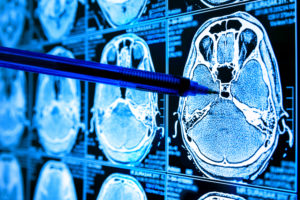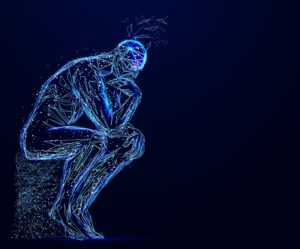
Bill Gates Says the Age of AI Has Begun, Bringing Opportunity and Responsibility

(agsandrew/Shutterstock)
The latter half of March has been a whirlwind moment for artificial intelligence. OpenAI released GPT-4 last week, and this week, Nvidia announced a new cloud services platform for generative AI while Google initiated the public release of its Bard AI chatbot.
It seems the world is at an inflection point with AI, and tech leaders are reflecting this sentiment with recent comments. Nvidia CEO Jensen Huang delivered a keynote at the company’s GTC developer conference Tuesday where he said, “We are at the iPhone moment of AI.”
Bill Gates agrees. The Microsoft founder shared his thoughts in a blog titled “The Age of AI Has Begun,” in which he considers the opportunities and responsibilities that AI presents to society.
Gates also compares AI to the revolution of smartphones and the mobile internet, as well as other tech breakthroughs that he was highly influential in expanding, remarking: “The development of AI is as fundamental as the creation of the microprocessor, the personal computer, the Internet, and the mobile phone. It will change the way people work, learn, travel, get health care, and communicate with each other. Entire industries will reorient around it. Businesses will distinguish themselves by how well they use it.”
As a philanthropist, Gates says he has been thinking a lot about how AI can reduce some of the world’s worst inequities, including the global 5 million children under five who die of largely preventable diseases each year. He emphasizes the potential of AI in reducing inequity and tackling global challenges like improving education and addressing climate change. However, Gates also recognizes the concerns and challenges associated with AI, such as workforce implications, privacy, and bias, while maintaining an optimistic view of its potential.
Balancing Our Fears
The potential and challenges of this technology cannot fully be explored until people learn more about it to gain a better understanding of its capabilities and limitations. To the average person without a background in machine learning and computer science, AI can feel mysterious, unrealistic, and sometimes scary. Many grew up with pop culture references to AI that were fantastical and exciting, such as KITT, the talking, sentient car on “Knight Rider” that accompanied David Hasselhoff on his criminal investigations. AI has also commonly been depicted as sinister, like the evil HAL 9000 computer in Stanley Kubrick’s “2001: A Space Odyssey” or Ultron from the “Avengers.” And don’t forget about the most evil of them all: Clippy, the masterfully annoying AI assistant of Microsoft Office’s past.
One can see the public’s fascination, mixed with apprehension, when reading through comments or viewing memes about ChatGPT, the AI chatbot that Huang referred to as “the AI heard around the world” in his GTC keynote. As a truly mainstream application of a large language model, ChatGPT garnered over 1 million users in its first week and is now a household name. While many are excited to use it, some think AI heralds the end of humanity as we know it, with a Skynet-esque takeover looming in the future, while others believe it will soon replace their occupation.
In his blog, Gates defines our current narrow form of AI as models designed for specific tasks or services. He notes how this is different from artificial general intelligence (AGI) which he defines as software capable of learning any task or subject while completely reasoning on its own. AGI does not yet exist, and its creation remains a debated topic in the computing world, he says. Despite this, Gates calls attention to how sophisticated narrow AI has become thanks to advancements in machine learning and computing performance. Thinking about how far AI has come in such a short time, perhaps the overreaction from the public isn’t such an overreaction?
Shifting the Focus to AI’s Potential
Gates wants readers to concentrate on the more positive aspects of AI’s potential. He addresses concerns about AI eliminating certain jobs, suggesting that ChatGPT can enhance job efficiency in areas where continuous learning is not crucial such as sales, service, and document handling. He also predicts that AI will become a “co-pilot” to office workers: “As computing power gets cheaper, GPT’s ability to express ideas will increasingly be like having a white-collar worker available to help you with various tasks. Microsoft describes this as having a co-pilot. Fully incorporated into products like Office, AI will enhance your work—for example by helping with writing emails and managing your inbox.” Instead of stealing jobs, AI assistants could make them easier by improving efficiency and freeing workers from undesirable tasks, leaving humanity to focus on human-centric roles like teaching and caregiving.
Healthcare is another area where Gates is optimistic, as he sees it increasing the efficiency of healthcare workers, assisting in tasks like paperwork and insurance claims, and driving innovation. It could even benefit poorer countries by helping health workers be more productive and enabling patients to perform basic triage if AI models could be adapted to suit the different needs, disease challenges, and languages of these regions. He also discusses how AI will accelerate medical breakthroughs: “The amount of data in biology is very large, and it’s hard for humans to keep track of all the ways that complex biological systems work. There is already software that can look at this data, infer what the pathways are, search for targets on pathogens, and design drugs accordingly. Some companies are working on cancer drugs that were developed this way.”
For education, Gates predicts that AI-driven software will revolutionize teaching and learning in the next 5-10 years by offering personalized content, engagement monitoring, and immediate feedback. But he notes AI will never replace the importance of student-teacher interaction: “Even once the technology is perfected, learning will still depend on great relationships between students and teachers. It will enhance—but never replace—the work that students and teachers do together in the classroom.” He also says we must address the existing digital divide and that equitable accessibility of AI to low-income schools will be crucial. Additionally, AI must be trained on diverse datasets to avoid bias, he cautions.
Acknowledging AI’s Limitations
As we’ve extensively discussed at Datanami, AI still has its problems and limitations to overcome, and Gates acknowledges this in his writing. Chatbots are plagued by hallucinations and have a limited understanding of context and abstract reasoning. There are also privacy, bias, and fraud risks which will require collaboration between governments and the private sector.

AI Chatbots tend to hallucinate, or completely fabricate information. (Gorbash-Varvara/Shutterstock)
Circling back to the mainstream worries of AGI taking over the physical world, Gates recognizes these concerns, asking, “Could a machine decide that humans are a threat, conclude that its interests are different from ours, or simply stop caring about us?” He answers, “Possibly, but this problem is no more urgent today than it was before the AI developments of the past few months.”
Gates says that “superintelligent” or “strong” AIs are definitely in our future and that we could achieve AGI once developers can generalize a learning algorithm and run it at the speed of a computer, something that could happen in either a decade or a century, according to Gates. Right now, AI does not control the physical world or set its own goals, and the expression of emotions and desires as we’ve seen with ChatGPT does not indicate meaningful independence. Bill Gates is not worried, and somehow, that feels reassuring.
Future Considerations
As for the future of AI, Gates presents predictions of major growth and competition in the hardware and software development surrounding AI, including innovative chip design and improved algorithms, especially for domain-specific areas. He cautions that public discussion on AI should be focused on three principles: balancing fear about AI’s downsides with its potential to improve lives, making sure governments and philanthropic organizations step in to ensure AI products and services help those most in need, and acknowledging that AI is still in its infancy and “Whatever limitations it has today will be gone before we know it.”
He concludes his essay with a few final thoughts on how the age of AI is filled with both opportunities and responsibilities: “I’m lucky to have been involved with the PC revolution and the Internet revolution. I’m just as excited about this moment. This new technology can help people everywhere improve their lives. At the same time, the world needs to establish the rules of the road so that any downsides of artificial intelligence are far outweighed by its benefits, and so that everyone can enjoy those benefits no matter where they live or how much money they have.”
Read his original blog post at this link, or view a recent interview with Gates on the topic here.
Related Items:
ChatGPT Puts AI At Inflection Point, Nvidia CEO Huang Says
Google Officially Releases Bard, Its ChatGPT Competitor
GPT-4 Has Arrived: Here’s What to Know






























